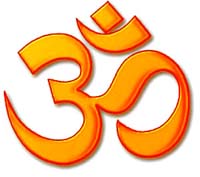| Hinduism |
 |
The underlying tenets of Hinduism cannot be easily defined. There is no unique philosophy that forms the basis of the faith of the majority of India's population. Hinduism is perhaps the only religious tradition that is so diversified in its theoretical premises and practical expressions as to be called a "museum of religions". This religion cannot be traced to a specific founder nor does it have a "holy book" as a basic scriptural guide. The Rig Veda, Upanishads and the Bhagwad Gita can all be described as the sacred text of the Hindus.
Unlike most other religions, Hinduism does not advocate the worship of one particular deity. One may worship Shiva or Vishnu or Rama or Krishna or some other gods and goddesses or one may believe in the 'Supreme Spirit' or the 'Indestructible Soul' within each individual and still be called a good Hindu. This gives an indication of the kind of contrasts this religion is marked by. At one end of the scale, it is an exploration of the 'Ultimate Reality'; at the other end there are cults that worship spirits, trees and animals.
|
 |
There are festivals and ceremonies associated not only with gods and goddesses but also with the sun, moon, planets, rivers, oceans, trees and animals. Some of the popular Hindu festivals are Deepawali, Holi, Dussehra, Ganesh Chaturthi, Pongal, Janamasthmi and Shiva Ratri. These innumerable festive occasions lend Hinduism its amazing popular appeal and make the Indian tradition rich and colorful. |
Hindu Mythology and the Living Gods
Heroes of epics like the Mahabharata and the Ramayana are immortalized and are still alive in the day-to-day existence of the common people. The gods of Hinduism are at once super-human and human and there is distinct feeling of warmth and familiarity towards them. Rama, the hero of the Ramayana, represents qualities such as honour, courage and valour and is held up as a model of manliness. His wife Sita is the prototypal Indian wife who is carried off by Ravana, the king of Lanka, while Rama and Sita are on exile. Sita's eventual rescue by Rama, his brother Lakshmana, and Rama's faithful monkey-general Hanuman are all woven into this engrossing tale. Stories from this epic have been passed down orally from one generation to the next. Religious fairs, festivals and rituals have kept these legends alive, and there is never an occasion that does not offer an opportunity to retell the old stories.
The stirring verses of the Mahabharata tell the story of the dynastic struggle between the Pandavas and the Kauravas, who were close cousins. Lord Krishna plays a very important role in this Great Epic. He is a friend, philosopher and guide to Arjuna, one of the Pandavas, and he helps Arjuna overcome his hesitation to kill his close relatives in the battlefield. The wise philosophy of Krishna and his teachings have been embodied in the Bhagwad Gita. Although the popular image of Krishna is that of a god who steals butter as a child, and who, as a youth, plays the flute and entices cows and cowherd girls alike; in his mature years he is depicted as the wise philosopher with a more serious side to his nature.
There are numerous gods and goddesses worshipped by Hindus all over India. Among these, the most fundamental to Hinduism, is the trinity of Brahma, Vishnu and Shiva - creator, preserver and destroyer respectively. Brahma has four heads corresponding to the four directions of the compass. He is the creator of life and the entire universe. Vishnu is the preserver who guides the cycle of birth and rebirth. He is also supposed to have taken many incarnations to save the world from evil forces. Both Rama and Krishna are believed to have been incarnations of Vishnu. Shiva, usually seen with a coiled cobra around his neck, destroys all evil and also has many incarnations, not all of which are terrifying.
The invisible deities are represented by a complexity of images and idols symbolizing divine powers. Many of these idols are housed within ornate temples of unparalleled beauty and grandeur. The Hindu gods are very much alive and live in temples, snow-capped peaks, in rivers and oceans and in the very hearts and minds of the Hindus.
|
|
|
| Festivals |
The Indian calendar is one long procession of festivals. These are as varied in origin as they are large in number. There are innumerable national, regional, local, religious, seasonal and social festivities. This is not surprising considering the fact that India is the land of gods, goddesses, saints, gurus and prophets.
Festivals here are characterised by colour, gaiety, enthusiasm, feasts and a variety of prayers and rituals. Travellers are struck by the scale and multiplicity of the festivities that populate the cultural scene of this land.
|
| Read more about Indian Festivals |
|
|
